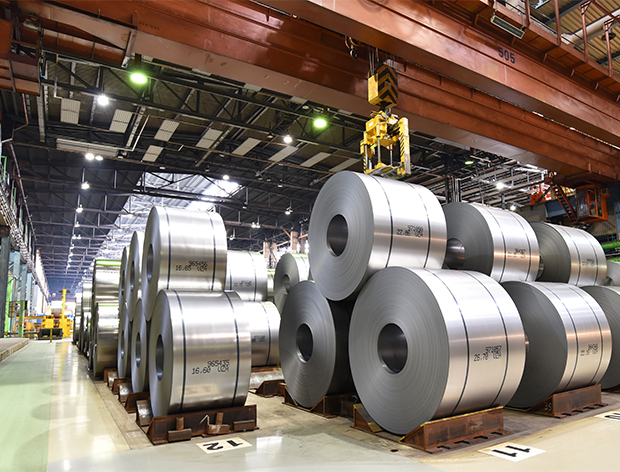US authorities are tightening restrictions on Iran’s steel, aluminium and iron exports, with a German-headquartered metals trader among nine companies newly added to their list of sanctioned entities.
The Office of Foreign Assets Control (OFAC), a federal sanctions regulator that sits within the US government, has listed four non-Iranian companies for having ties to Mobarekeh Steel Company – Iran’s largest steel manufacturer – which has been subject to sanctions since 2018.
It has also designated four Iran-based metals producers, including another Mobarekeh subsidiary, as well as a graphite supplier with addresses in China and Hong Kong.
“The Iranian regime continues to use profits from metals manufacturers and foreign sales agents to fund destabilising behaviour around the world,” says US Treasury secretary Steven Mnuchin.
“The United States remains committed to isolating key sectors of the Iranian economy until the revenues from such sectors are refocused toward the welfare of the Iranian people.”
Iran’s metals industry has been subject to OFAC sanctions since an executive order in May 2019 set out the risks associated with its iron, steel, aluminium and copper trade.
June’s announcement is only the second round of sanctions targeting those sectors, however, following a January order against eight Iranian officials, 13 manufacturers and a supplier based in Oman.
Among the firms sanctioned for ties to Mobarekeh is Germany-based Tara Steel Trading, which is headquartered a short distance east of Dusseldorf’s city centre.
The company has minimal online presence and could not be reached by GTR, and publicly available due diligence information from specialist information services report difficulty in ascertaining its ultimate beneficial ownership and control.
OFAC says the company is a wholly owned Mobarakeh subsidiary, and generated the equivalent of US$60mn in sales in 2018. Its assets held are valued at over US$100mn. It is also accused of purchasing spare parts worth tens of millions of dollars on behalf of its sanctioned parent company.
The regulator has further identified three sales agents based in the UAE as being majority-owned by Mobarekeh. It says Pacific Steel, Tuka Metal Trading and Better Future General Trading were found to have engaged in the import and export of Iranian metal products, with the latter claiming to be “the main exporter of Mobarakeh Steel Company products regionally”.
Mobarakeh itself became subject to OFAC restrictions after it was accused of helping fund an Iranian investment company with close ties to Basij, a paramilitary force controlled by the Iranian Revolutionary Guard Corps (IRGS).
The US government says the company is the Middle East and North Africa’s largest flat steel producer and accounts for around 1% of Iran’s gross domestic product.
The new measures also target a supplier to Iran’s metals industry. Global Industrial and Engineering Supply is accused of knowingly transferring 300 metric tons of graphite to an already-sanctioned Iranian shipping company, which the US says is a “critical material for Iran’s metals industry”.
Within Iran, four companies – Metil Steel, South Aluminum Company, Sirjan Jahan Steel Complex and Iran Central Iron Ore Company – have also been added to OFAC’s sanctions list. Metil Steel is also majority-owned by Mobarakeh, the regulator says.
Iranian aluminium trade as weapons risk
The US announcement comes as Iran looks to boost its production of aluminium. In April this year, South Aluminum Corporation opened the country’s largest production facility in the southern province of Fars; mining and trade minister Reza Rahmani said at its inauguration it would deliver a 63% increase in national aluminium output by March 2021.
That could prove a concern to the US’ efforts to stifle Iran’s military capacity, which have accelerated since President Donald Trump withdrew the US from the 2015 Joint Comprehensive Plan of Action – a historic agreement whereby Iran would cease nuclear weapon production in exchange for the lifting of European and American sanctions.
A recent investigation by Reuters reveals that aluminium powder is currently being used to support Iran’s missile programme. Citing Amir Moghadam, a former government official who now lives in France, the report describes a little-known facility operated by the IRGS based in Jajarm, a city in the north east of the country.
Reuters says the use of aluminium powder for military use began at least five years ago, and was developed in response to restrictions on Iran’s ability to acquire advanced weapons technology.
A spokesperson for Iran’s mission to the UN in New York responded by denying those claims, saying that it “never had any intention to produce any nuclear warheads or missiles”, and that any missile programme is solely defensive.
For financial institutions, the risk of falling foul of OFAC’s sanctions regime is not confined to US-based firms. The regulator is empowered to take action against any institution that interacts with the US financial system – for instance by facilitating dollar-denominated trade – even if it has no US presence.
Washington, DC-based lawyer Francesca Guerrero, a partner at Thompson Hine’s international trade practice, says firms involved in international metals trade will likely already have OFAC’s targeting of the metals sector in Iran firmly on their radar.
Since a January 2020 executive order, foreign financial institutions have faced sanctions exposure if they facilitate restricted metals trade activity linked to the country. “That has heightened the risk for financial institutions,” Guerrero tells GTR.
“What was interesting about this action is that OFAC lists some companies that are outside Iran, outside the UAE, and that are sales agents,” she adds.
“Those companies are going to be the ones that are harder for financial institutions to identify unless they are doing a substantial amount of due diligence on metals trades.”







